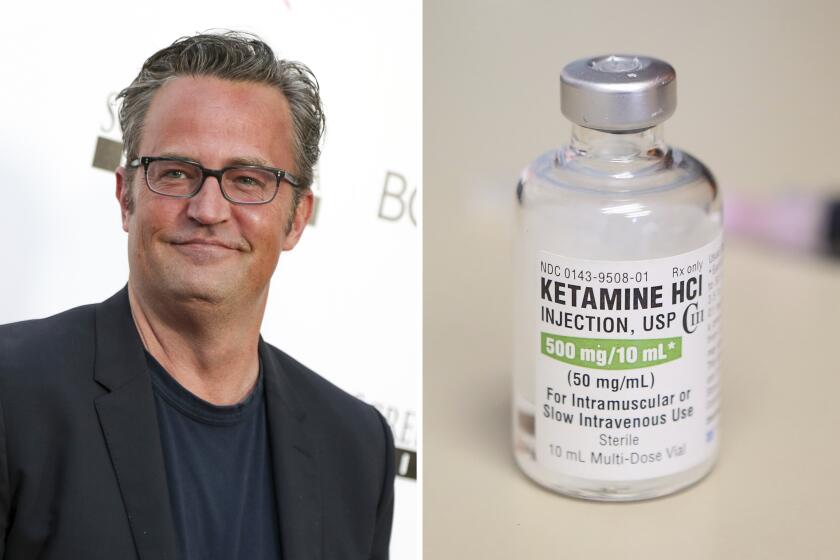They mocked Matthew Perry as ‘Chandler’ and ‘moron.’ Actor was exploited before his death, feds say

- Share via
In the month before Mathew Perry’s death, a doctor the actor contacted to acquire ketamine called him a “moron” in a text message, according to federal prosecutors.
A dealer who authorities say supplied the drug to Perry referred to him as “Chandler” — the sarcastic yet sweet-natured character he played on the hit television show “Friends,” court documents say.
Federal authorities have depicted in court filings and public statements a scheme in which medical professionals and street dealers exploited Perry, who had been open about his years-long struggle with addiction, to enrich themselves.
Five people — two doctors, an alleged drug dealer known as “Ketamine Queen,” a former film director and Perry’s live-in assistant — have been charged in a conspiracy to distribute ketamine, an anesthetic, to the actor.
Prosecutors laid out a criminal case against the defendants. But experts familiar with addiction treatment say the picture of drug use alleged in court papers followed an all too common path: An addict is desperate for a fix and those supplying the drug are happy to maintain the business.
“People can be victimized because they are really highly motivated to seek that substance and nothing else is going to satisfy them,” said Jessica Borelli, a professor of psychological science at UC Irvine.
Perry was found dead in a hot tub at his Los Angeles home on Oct. 28. Authorities later determined he had died from acute effects of ketamine.
U.S. Atty. Martin Estrada said during a news conference this month that those charged in the case “cared more about profiting off of Mr. Perry than caring for his well-being.”
“Drug dealers selling dangerous substances are gambling with other people’s lives over greed,” he said.
Often an overdose is seen as a failing of the victim. But the sordid case to emerge from the “Friends” star’s death shows there are many people in the chain of blame.
Federal prosecutors said Perry started ketamine therapy at a local clinic, where he had sought treatment for depression and anxiety. Ketamine use for depression is a relatively new therapy, but some medical professionals who spoke to The Times say it shows promising results when administered correctly.
While the most frequently used antidepressants affect serotonin, dopamine and other neurochemicals in the brain, ketamine works on the N-methyl-D-aspartate (NMDA) system and can be helpful for treatment-resistant depression. Still, there are risks and the potential for addiction to the powerful drug, said Dr. Robert McCarron, a professor of psychiatry and associate dean of medical education at UC Irvine.
“Ketamine has the potential to harm someone or kill someone if not monitored carefully and used in an approved therapeutic way,” McCarron said, adding that Perry likely didn’t know that taking additional amounts of ketamine outside of therapy could be fatal.
“He didn’t go to medical school. He probably figured it made him feel good and lowered his depression so maybe more was better,” McCarron said.
The American Society of Ketamine Physicians, Psychotherapists & Practitioners has raised concerns about whether Perry was a good candidate for ketamine treatment at all.
“In order to safely continue ketamine infusions with his history of substance abuse, his treatment plan would needed to have been implemented by someone highly knowledgeable and experienced with ketamine as one part of an overall substance abuse treatment program,” the organization said in a statement.
Federal authorities say Perry became addicted to the powerful drug, and when clinic doctors refused to increase his dosage, the actor turned to Salvador Plasencia, an internist who went by the nickname “Dr. P.”
Federal prosecutors allege that Perry’s live-in assistant, Kenneth Iwamasa, worked with two doctors — Mark Chavez and Plasencia — and drug dealers Jasveen Sangha and Erik Fleming to obtain thousands of dollars’ worth of ketamine for Perry in the month before his death.
Sangha and Plasencia have both pleaded not guilty. Their attorneys could not be reached for comment. Iwamasa pleaded guilty this month to a count of conspiracy to distribute ketamine causing death. Fleming pleaded guilty this month to a count of conspiracy to distribute ketamine and a count of distribution of ketamine resulting in death. Chavez has agreed to plead guilty to a count of conspiracy to distribute ketamine, according to court records.
In text messages with Chavez, who had experience with ketamine, Plasencia pondered how much to charge Perry for the drug, writing in a text message: “I wonder how much this moron will pay” and “lets find out,” according to an indictment filed in court.
Plasencia also wrote in messages to Chavez that he didn’t want Perry to “look elsewhere” for his ketamine supply. According to the indictment, Plasencia wrote that he wanted to be “his go to.”
In total, the doctors distributed 20 vials of ketamine to Perry for $55,000 in cash, charging him $2,000 for a vial that cost Chavez $12, authorities said.
“Matthew Perry’s journey began with unscrupulous doctors who abused their position of trust because they saw him as a payday and it ended with street dealers who sold him ketamine in unmarked vials,” U.S. Drug Enforcement Administration Administrator Anne Milgram said during a news conference this month. “The desperation that led Perry to these individuals was not met with help, as it should have been from the doctors, but instead it was met with exploitation.”
After federal authorities announced charges against a medical professional allegedly linked to the death of actor Matthew Perry, the popular drug ketamine faces new scrutiny.
By mid-October, Perry and his assistant had been communicating with Fleming — an acquaintance of the actor’s — who had a source that could provide the drugs at a lower cost.
Fleming texted Perry that he had “a bunch of the K in liquid,” which he would sell at a “good price” and a “fair tip” for delivering it, according to a plea agreement Fleming made with prosecutors.
“I wouldn’t do it if there wasn’t a chance of me making some money for doing this,” Fleming told Iwamasa, according to the indictment.
Fleming delivered a sample to Perry’s home for $180 on Oct. 13, according to the indictment. Iwamasa told Fleming the drug “seems good” and asked for more.
When Sangha communicated with Fleming about the sale, she referred to Perry “using the name of a well-known character that [Perry] portrayed in a television series,” according to Fleming’s plea agreement. Law enforcement sources told The Times she called him “Chandler.”
The next day, Fleming arrived at Perry’s home with 25 vials, charging $5,500 and pocketing an additional $500 for coordinating the deal, prosecutors said. While Sangha had quoted Fleming $160 per vial of ketamine, authorities say Fleming charged Perry $220 per vial.
Ten days later, Fleming delivered another 25 vials to the actor’s home along with ketamine lollipops that prosecutors say Sangha threw in as a bonus for the large order, according to the indictment.
In the final days of Perry’s life, court records indicate there were signs the actor’s addiction was spiraling out of control. Iwamasa was injecting the actor with ketamine six to eight times a day, authorities said. The aide had found Perry unconscious at his house on at least two occasions in October, the indictment showed.
In announcing arrests in the death of “Friends” star Matthew Perry, authorities unveiled a disturbing narrative of the weeks leading up to his final day.
In less than a month, Fleming and Sangha sold about 50 vials of the drug to the actor for about $11,000, according to prosecutors.
Experts say it’s not uncommon that someone abusing a drug would spend exorbitant amounts of money to get access to it.
When someone is abusing a drug, their way of processing rewards changes, so “what’s rewarding to most people ceases to be rewarding to people who have a substance use disorder,” said Borelli.
This can lead to people disregarding consequences in their pursuit of the substance, experts said.
“Addiction is like an ironclad compulsion,” said Dr. Michael McDaniel, the medical director of Heartland House in San Diego. “For the person suffering from substance-use disorder, there is practically nothing they can do to not use. So with something like ketamine, where the supplies are pretty strictly controlled and limited, the suffering person would be at the mercy of whoever was supplying them.”
More to Read
Sign up for Essential California
The most important California stories and recommendations in your inbox every morning.
You may occasionally receive promotional content from the Los Angeles Times.














